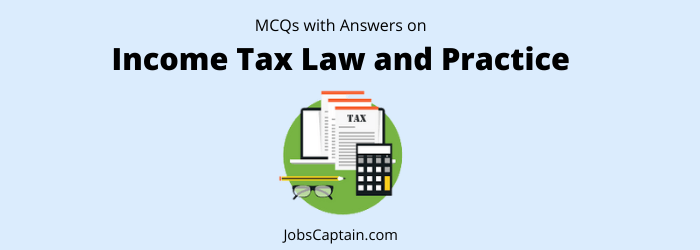
Income Tax Law and Practice MCQs with Answers is a comprehensive guide to understanding and preparing for income tax law and practice exams. The Quiz covers all major topics in income tax law and provides practice questions with detailed answers.
Question 1. __________ is / are empowered to levy and collect income tax. A. State governments.
(A) Local self-government department
(B) RBI
(C) Central Government
(D) State governments
Question 2. In which year Income Tax was levied in India for the first time?
(A) 1857
(B) 1860
(C) 1961
(D) 1960
Question 3. Income Tax Act was passed in the year_____________.
(A) 1962
(B) 1956
(C) 1961
(D) 1955
Question 4. CBDT is control by ______________.
(A) Central Government
(B) State Government
(C) Both (A) and (b)
(D) None of the above
Question 5. previous year started from ______________.
(A) September
(B) January
(C) March
(D) April
Question 6. Who is Tax payer?
(A) Govt. employee
(B) Trust
(C) Businessman
(D) Assessee
Question 7. Income tax is a _____________.
(A) Indirect tax
(B) Direct tax
(C) Profession tax
(D) Business tax
Question 8. A person is said to be an ordinarily Resident when the person is satisfying ________________.
(A) Not basic and additional conditions
(B) Only additional conditions
(C) Only basic conditions
(D) Both basic and additional conditions
Question 9. A person is said to be a non resident when he is _______________.
(A) Fulfilling both basic and additional conditions
(B) Fulfilling only additional conditions
(C) Fulfilling only basic conditions
(D) Not fulfilling any one of the basic conditions
Question 10. Who is assessee in case of a HUF?
(A) Deemed Karta
(B) Karta
(C) Spouse
(D) Father
Question 11. Education cess on tax payable is at.
(A) 5%
(B) 3%
(C) !%
(D) 2%
Question 12. Agriculture Income is __________.
(A) None of the above
(B) Partly taxable
(C) Not taxable
(D) Taxable
Question 13. Section 10 0f Income Tax Act deals with _________.
(A) Casual incomes
(B) Income from salary
(C) Exempted incomes
(D) Deductions
Question 14. Income Tax Authorities are grouped into two main wings Administrative and……………..
(A) Clerical.
(B) Executives.
(C) Managerial.
(D) Judicial.
Question 15. The highest Administrative Authority for Income Tax in India is…………
(A) Director of Income Tax.
(B) President of India.
(C) CBDT.
(D) Finance Minister.
Question 16. What is the exemption limit in Hostel Expenditure Allowance?
(A) Rs.500pm
(B) Rs.400pm
(C) Rs.300pm
(D) Rs.200pm
Question 17. Rates of Income tax are fixed under …………………..
(A) Notification of CBDT
(B) The Finance Act
(C) The Income Tax Act
(D) An Ordinance
Question 18. The number allotted by income tax authorities to assessees for identification and which should be quoted in all documents and correspondence is ____________.
(A) Licence No.
(B) Permanent Account Number (PAN).
(C) Register No.
(D) I.D. No.
Question 19. Deduction of tax at source made for incomes which can be calculated in advance is called ___________.
(A) M.A.S.
(B) F.A.S.
(C) P.A.S.
(D) T.D.S.
Question 20. The due date of filing of return by a nonbusiness assessee is _____________.
(A) 30th November.
(B) 31st July.
(C) 31st August.
(D) 30th June.
Question 21. Under the income- tax act, the incidence of taxation depends on ____________.
(A) The gender of the taxpayer
(B) The residential status of the tax-payer.
(C) The age of the taxpayer
(D) The citizenship of the tax-payer.
Question 22. Unabsorbed depreciation can be carried forward for set off ____________.
(A) for a period of eighteen years only.
(B) for an unlimited number of years.
(C) for a period of eight years only.
(D) for a period of four years only.
Question 23. residential status is determined for _____________.
(A) Financial year.
(B) Accounting year
(C) Assessment year
(D) Previous year
Question 24. How many heads of income are there to compute Gross total income.
(A) Three.
(B) Four.
(C) Five.
(D) Six.
Question 25. Income Tax Act came into force on _______________.
(A) 01-04-1965
(B) 01-04-1956
(C) 01-04-1962
(D) 01-04-1961
